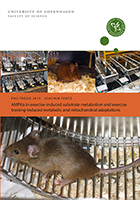PhD defence: AMPKα in exercise-induced substrate metabolism
and exercise training-induced metabolic and mitochondrial adaptations
Joachim Fentz
PhD thesis
A bout of exercise potently stimulates skeletal muscle energy metabolism. The turnover of the main energy source, ATP, may rise up to ~100 fold compared to the resting state and this presents a substantial stress on skeletal muscle ATP regeneration. Acute regulation of skeletal muscle glucose and fatty acid metabolism is important to maintain an adequate energy level.
To prepare for future events of metabolic stress, the muscle increases its metabolic capacity through several mechanisms. Some of the most important are increases in muscle capillarization and in expression of metabolic and mitochondrial proteins that transport and metabolize glucose and fatty acids.
The protein AMPK is activated by a decrease in cellular energy status and has been proposed to regulate both acute metabolism (e.g. glucose uptake with exercise) and long-term adaptations (e.g. metabolic and mitochondrial protein levels with exercise training) in skeletal muscle.
This is mainly supported by studies using pharmacological activators of AMPK, whereas the use of mice carrying mutations in the gene coding for AMPKα (α is the “signal propagating” subunit in the trimeric AMPK complex) has only provided minor or no evidence supporting the importance of AMPK. However, previously mutated AMPK mouse models have only targeted one of the two AMPKα isoforms (α1 or α2), not leading to a complete abrogation of AMPK function. By applying a novel mouse model harboring muscle specific AMPKα1+AMPKα2 deletion we have investigated the role of AMPKα in exercise-induced skeletal muscle metabolism and adaptations to exercise training.
2015, 174 sider,
ISBN 978 87 7611 930 0
Time
23 September 2015, 14:00
Venue
Auditorium 1, August Krogh Building, Universitetsparken 13, DK-2100 Copenhagen.
Opponents
Ylva Hellsten (chair), Professor, Department of Nutrition, Exercise and Sports, University of Copenhagen, Denmark.
Gregory Steinberg, Professor, Mc Master University, Canada.
Sebastian Beck Jørgensen, Senior research scientist, Novo Nordisk A/S, Denmark.
Supervisor
Jørgen Wojtaszewski, professor, Department of Nutrition, Exercise and Sports, University of Copenhagen, Denmark.

